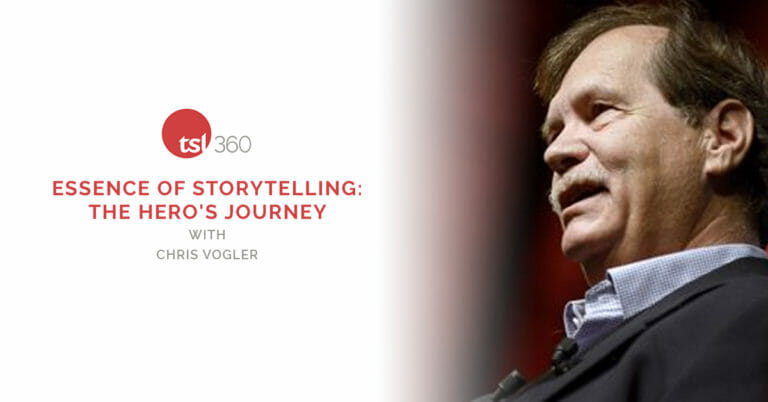By Valerie Kalfrin · May 13, 2019

Veteran story consultant Christopher Vogler has been immersed in stories for so long, he can spot plot patterns on the fly and archetypes in real life—but he still loves watching creatives play outside the lines.
“There’s a wonderful kind of Renaissance going on now where everybody knows the pattern, so it makes it a wonderful playground for the artist to try to do something different,” he said in a TSL 360 video, citing Game of Thrones as one example. “That’s the one that seems to be deliberately hacking off pieces of this pattern or leading you to think, ‘Hey, these Stark people, they’re wonderful people, and we were going to follow them all the way through, right?’ … No.”
Vogler has been a development executive at Warner Bros. and other studios. His first film work was in the U.S. Air Force, making documentaries about the military space program. He was a story analyst at 20th Century Fox and part of the story staff at Walt Disney Pictures, where he contributed to the screenplay for 1994’s The Lion King. He’s perhaps best known for his 2007 screenwriting guide, The Writer’s Journey: Mythic Structure for Writers, and has consulted on films such as I Am Legend, The Wrestler, and the 2010 remake of The Karate Kid.
As a Missouri farm boy in the 1950s, Vogler so loved how films told stories that he’d feel goosebumps on his arms and shivers down his spine watching them. “I just wanted to tear the screen open and crawl in there, you know, and see, is there any way I can be involved in this thing?”
The story patterns that resonated with him back then didn’t fully click until he was in film school at the University of Southern California in the late 1970s. There, he read Joseph Campbell’s famed book, The Hero with a Thousand Faces, then saw another farm boy onscreen: Luke Skywalker. “Star Wars was a big impact on all of us in film school. It changed all of our careers, changed the direction of Hollywood, but it had a particular impact on me because I had just read Campbell’s work, and there it was on the screen.”
Campbell’s work inspired The Writer’s Journey, where Vogler deconstructs eight archetypes and twelve story stages specifically with film, TV, and visual storytelling in mind. (Vogler wrote the foreword for Myth & The Movies: Discovering the Mythic Structure of 50 Unforgettable Films by Stuart Voytilla, which can be considered a Writer’s Journey companion piece.)
Here, Vogler shares five things he’s noticed about story patterns throughout his career and how they bleed into life. Hear him elaborate further with a TSL 360 membership. TSL 360 also grants you access to dozens of masterclasses, interviews, and lectures from Academy Award-winning screenwriters, Emmy-winning TV writers, producers, agents, and major studio executives.
We’re wired to tell and understand stories in certain ways. Breaking these patterns challenges writers to make their work memorable. “You have to set out every time you tell a story to know the form, know the pattern, know it backwards, forwards, inside out, and break the pattern somehow,” he said. “Find a way to do that pattern that everybody knows and everybody’s got in their [sic] nervous system. Everybody has seen a thousand examples, a million examples, but your obligation as an artist is to break the pattern.”
At some point in our lives, we all identify with heroes, or we admire them or we’re fascinated by them, Vogler said. But to Campbell and ancient myths, heroes were people who took the tough road.
“It’s not about superheroes so much; they might have superpowers. It’s not about being better than everybody else. It’s really about sacrificing on behalf of somebody else, usually on behalf of a larger group than your own, or getting outside of your own orbit. Taking responsibility for something greater than your own welfare. Maybe giving up something that’s dear to you in order to advance the cause of the group or to save somebody,” he said.
Likewise, the archetype known as “the shadow” is commonly an antagonist, but it’s not always malicious. “It simply means everything inside us that we are afraid of or that we’re ashamed of, or that we don’t understand or we don’t have control over,” Vogler said. “Most of the time we think of the shadow or the villain as a dangerous negative force, but sometimes they can be a source of learning. You can find out from opposition where you’re weak, where you need to work harder. A good opponent can make a strong hero.”
You can’t have a story without a call to adventure, or something that tells the audience there’s a problem and this particular protagonist has to solve it. But to get an audience on board, every hero also needs a clear yearning.
“I’ve read quite a few scripts and also heard readings of people’s screenplays, and they might have everything in place. The dialogue is good. The plot is interesting. The scene is interesting. The characters are good. But I absolutely don’t care until somebody says, ‘I wish’ or ‘I want,’” Vogler said. “‘I want to get out of here,’ or ‘I want to find my true calling,’ or something like that. Then the game is now my game.”
Vogler describes the “threshold guardian” as a figure who appears in stories whenever the protagonist crosses some type of border and finds someone blocking the path. The hero’s task is to figure out whether this person is a serious threat or simply a test.
He uses this same term to identify people with whom he’s had disagreements. For instance, shortly before his book was published, someone was critical of his work, which irked him. But once he recognized this critic as a “threshold guardian” testing him, he invited the critic to participate in a lecture, where the audience enjoyed their give and take.
“Any time you run into ‘no,’ it is probably being delivered by a threshold guardian. The myths are filled with ways to deal with those figures, and usually, it’s not by attacking them and killing them. It’s by undermining them or seducing them, or drawing them into your performance … or recognizing that they are not really separate from you,” he said. “There might be that illusion that they are working for the villain and that they’re of a different tribe or have a completely different nature. But in fact, those are gaps that can be bridged. Sometimes, you can bring the threshold guardian over to your side.”
Campbell called the final story stage “the return with the elixir,” which Vogler respects immensely. Even if a protagonist returns successfully from an adventure, having faced death and learned a great lesson, it means nothing if the hero doesn’t share the deed.
“If … you come home and you don’t share it with everybody else, you did nothing. You did not do a heroic act. You are not allowed to wear the hero hat. You can’t wear the hero T-shirt. You can’t wear the sword. You don’t get any of the powers because you failed at the last minute, and that last test is to share it with everybody else,” he said.
That’s because as long as there have been storytellers, regardless of form, stories were meant to be shared. “That’s what we do with our stories. We try to take people on this journey where they go to the highest heights and the lowest lows and are transformed by them,” Vogler said. “[They] then come out with some little thing to take home with them that will maybe start to change their life in some little way.”
8 Tips for Great Pitches for Film & TV with Monique Sorgen
Elements of a Dramatic Scene with David Howard
Securing Distribution for Your Film with Alexandra Boylan
The 11 Fundamental Questions with Aaron Mendelsohn
7 Strategies for ‘Producing People’ and Being a Great Producer with Kristen Murtha

 Valerie Kalfrin is an award-winning crime journalist who now dives into fictional mayhem as an author (Quicklet on The Closer: Season 1), essayist, film critic, screenwriter, and emerging script consultant. She also writes for The Guardian, Bright Wall Dark Room, ScreenCraft, Hazlitt, Signature, and the blog for Final Draft, the top-rated screenwriting software used by the filmmaking industry. A member of Screenwriters of Tomorrow, she’s collaborated on short films and features, and she’s affiliated with the Tampa Bay Film Society. She lives in Florida. Find her online at valeriekalfrin.com.
Valerie Kalfrin is an award-winning crime journalist who now dives into fictional mayhem as an author (Quicklet on The Closer: Season 1), essayist, film critic, screenwriter, and emerging script consultant. She also writes for The Guardian, Bright Wall Dark Room, ScreenCraft, Hazlitt, Signature, and the blog for Final Draft, the top-rated screenwriting software used by the filmmaking industry. A member of Screenwriters of Tomorrow, she’s collaborated on short films and features, and she’s affiliated with the Tampa Bay Film Society. She lives in Florida. Find her online at valeriekalfrin.com.
For all the latest from The Script Lab, be sure to follow us on Twitter, Facebook, and Instagram.